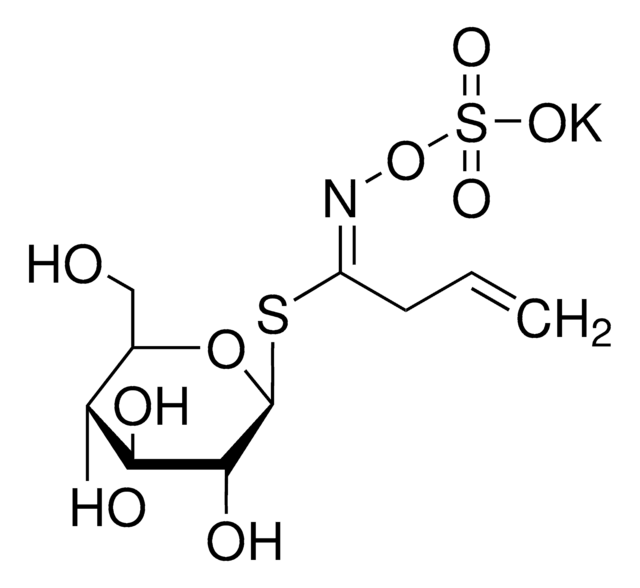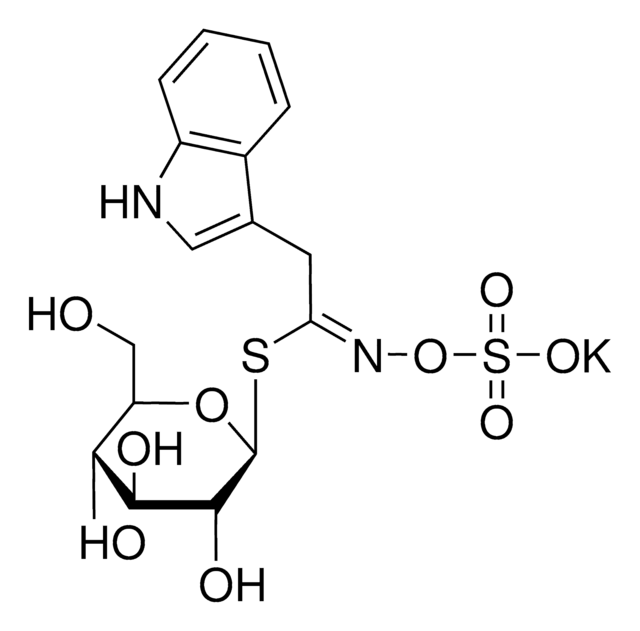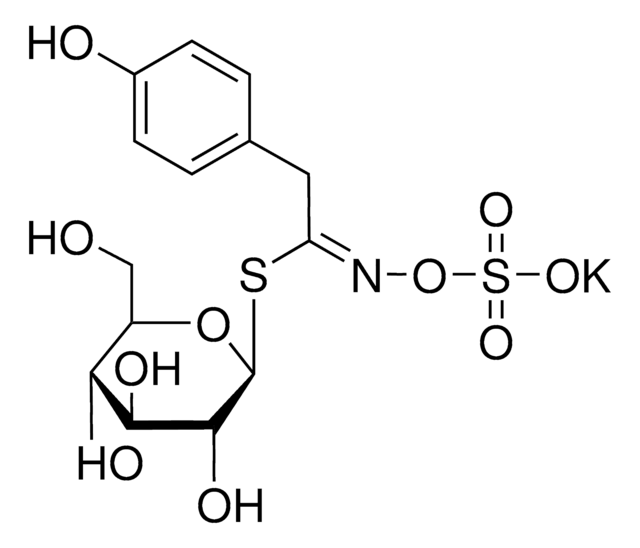T4528
Thioglucosidase from Sinapis alba (white mustard) seed
≥100 units/g solid
Synonym(s):
Glucosinolase, Myrosinase, Thioglucoside glucohydrolase
Sign Into View Organizational & Contract Pricing
All Photos(1)
About This Item
CAS Number:
MDL number:
UNSPSC Code:
12352204
NACRES:
NA.54
Recommended Products
biological source
plant seeds (Sinapis alba)
form
solid
specific activity
≥100 units/g solid
storage temp.
−20°C
Related Categories
General description
Thioglucosidase, also called as myrosinase, is present in the myrosin cells that do not contain glucosinolates. This enzyme is obtained from several plant sources, such as Lepidium sativum, L. Sinapis alba and Brassica napus.
Application
Thioglucosidase from Sinapis alba (white mustard) seeds has been used as a standard to quantify myrosinase activity and in column glucosinolate analysis of plant samples.
Thioglucosidase has been used in a study to assess Brassica species screening for glucosinolate content. Thioglucosidase has also been used in a study to investigate a negative regulatory role for auxin in sulphate deficiency response in Arabidopsis thaliana.
Biochem/physiol Actions
Thioglucosidase research has focused mainly on the cruciferous crops due to their economic importance and cancer preventive benefits.
Myrosinases are present in many bacteria, fungi, and edible plants, including those of the Brassicaceae (Cruciferae) family. The enzyme hydrolyzes the S-glucosidic bond of a glucosinolate substrate to form an unstable aglycone that rearranges with the loss of sulfate primarily to the isothiocyanate, though thiocyanates and nitriles are also formed. Many of the isothiocyanate products of aliphatic and aromatic glucosinolates have cancer chemopreventive properties.
Unit Definition
One unit will produce 1.0 μmole glucose per min from sinigrin at pH 6.0 at 25 °C.
Signal Word
Danger
Hazard Statements
Precautionary Statements
Hazard Classifications
Resp. Sens. 1
Storage Class Code
11 - Combustible Solids
WGK
WGK 3
Flash Point(F)
Not applicable
Flash Point(C)
Not applicable
Personal Protective Equipment
dust mask type N95 (US), Eyeshields, Gloves
Certificates of Analysis (COA)
Search for Certificates of Analysis (COA) by entering the products Lot/Batch Number. Lot and Batch Numbers can be found on a product’s label following the words ‘Lot’ or ‘Batch’.
Already Own This Product?
Find documentation for the products that you have recently purchased in the Document Library.
Customers Also Viewed
Fernando B Luciano et al.
International journal of food microbiology, 145(1), 69-76 (2010-12-15)
Work examines the origin of bactericidal activity in mustard flour and explores the relative contribution from starter cultures, E. coli O157:H7 itself and other sources. Bacteria can degrade naturally occurring glucosinolates in mustard and form isothiocyanates with antimicrobial activity. In
Berta Gallego et al.
Physiologia plantarum, 159(4), 401-415 (2016-10-14)
The hypothesis of metal defense as a substitute for a defective biotic stress signaling system in metal hyperaccumulators was tested using the pathosystem Alternaria brassicicola-Noccaea caerulescens under low (2 µM), medium (12 µM) and high (102 µM) Zn supply. Regardless
Palatability of Thlaspi caerulescens for snails: influence of zinc and glucosinolates
Noret N, et al.
The New phytologist, 165(3), 763-772 (2005)
Si-Jun Zheng et al.
Journal of chemical ecology, 37(8), 818-829 (2011-06-22)
The jasmonic acid (JA) signaling pathway and defensive secondary metabolites such as glucosinolates are generally considered to play central roles in the defense of brassicaceous plants against herbivorous insects. To determine the function of specific plant genes in plant-insect interactions
Hanbin Dan et al.
Plant molecular biology, 63(2), 221-235 (2006-10-26)
Sulphate is a major macronutrient required for the synthesis of the sulphur (S)-containing amino acid cysteine and thus is critical for cellular metabolism, growth and development and response to various abiotic and biotic stresses. A recent genome-wide expression study suggested
Our team of scientists has experience in all areas of research including Life Science, Material Science, Chemical Synthesis, Chromatography, Analytical and many others.
Contact Technical Service

















